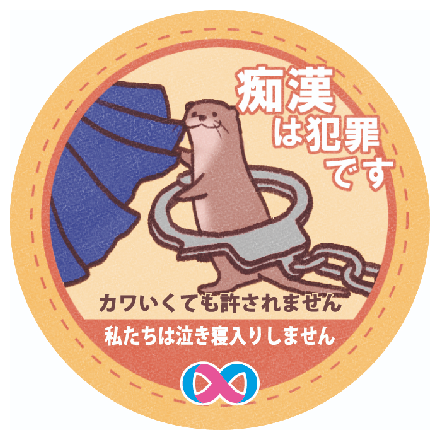
Nationwide contest attracts more than 580 entries to combat one of Japan’s most shameful social phenomena.
Back in 2015, a Japanese high school girl with the pseudonym Takako, a victim of chikan (train gropers) on multiple occasions, and her mother started a crowdfunding campaign. The pair were seeking funds to produce anti-chikan pins, which young women could attach to their bags or clothing to let would-be gropers that they were not going to take any abuse quietly.
That initiative eventually led to the creation of an annual design contest administered by the Molester Deterrence Activity Center activist organization. The Center has just announced the winners of this year’s contest, which attracted 581 entries designed by students from 126 schools across Japan.
The judges’ selection for the grand prize, pictured above, was created by Shota, a student at Sadowara Miyazaki Prefectural High School. Like all the entries, it contains the declarations “Groping is a crime” and “We won’t take this quietly” (the Japanese phrasing translates literally as “We won’t cry ourselves to sleep”), but Shota’s design also includes the additional warning that “Even if you’re cute, you won’t be forgiven” as a river otter attempts to flip up a schoolgirl’s pleated skirt, with the intended message, as per Shota’s design notes, that “No matter what kind of person does it, groping is wrong.”
In addition, the judges awarded outstanding performance awards to the “No!!!” badge from Feriko, of Musashino Art University, and the camera lens design from Niigata College of Art and Design’s Hideto Mori.
Special jury prizes were also given to Chugoku Design College’s Komoko, with a badge reminding potential chikan that surveillance camera footage can and will be used against them in criminal investigations, and Osaka Information and Computer Science College’s Miki Hatoko, whose entry takes the stance that train groping is such a despicable act that even the non-human members of the animal kingdom are disgusted by it.
Of course, no one in Japan thinks that groping women on the train is legal, so some people might be skeptical about how effective such badges would be. However, mental health professional and social worker Akira Saito, the contest’s advisor, believes such symbols can be an effective deterrent. “I’ve been involved with the treatment of over 2,000 sex offenders,” Saito says, “In interviews regarding their cognitive distortions, they primarily targeted junior and senior high school girls, but this wasn’t simply because they like the look of school uniforms. It’s because they see the uniforms as symbols of obedience.”
Because of that, Saito believes that a clear visual message of assertiveness has the potential to dissuade would-be chikan. “I’ve asked people I’ve treated how they would react to seeing [an anti-chikan] badge, and many of them responded with ‘I probably wouldn’t try to grope the person,’” Saito reports.
Previous winners of the Molester Deterrence Activity Center’s design contest have been sold through participating stores (listed here) and the organization’s affiliated online store, and the 2019 winners are likely to join them soon.
Source: Molester Deterrence Activity Center via IT Media
Top image: Pakutaso
Insert images: Molester Deterrence Activity Center
● Want to hear about SoraNews24’s latest articles as soon as they’re published? Follow us on Facebook and Twitter!




 Japanese schoolgirl seeking crowdfunding, art submissions to produce anti-train groper pins
Japanese schoolgirl seeking crowdfunding, art submissions to produce anti-train groper pins Plus-size Japanese model lets her anger fly in new-type anti-train groper posters
Plus-size Japanese model lets her anger fly in new-type anti-train groper posters Japan Extreme Budget Travel! A trip from Tokyo to Izumo for just 30,000 yen [Part 2]
Japan Extreme Budget Travel! A trip from Tokyo to Izumo for just 30,000 yen [Part 2] Which convenience store onigiri rice balls are the most popular? Survey reveals surprising results
Which convenience store onigiri rice balls are the most popular? Survey reveals surprising results Starbucks Japan releases first-ever Hinamatsuri Girls’ Day Frappuccino
Starbucks Japan releases first-ever Hinamatsuri Girls’ Day Frappuccino Japan Extreme Budget Travel! A trip from Tokyo to Izumo for just 30,000 yen [Part 1]
Japan Extreme Budget Travel! A trip from Tokyo to Izumo for just 30,000 yen [Part 1] Japan has only one airport named after a samurai, so let’s check out Kochi Ryoma【Photos】
Japan has only one airport named after a samurai, so let’s check out Kochi Ryoma【Photos】 Japanese restaurant chain serves Dragon Ball donuts and Senzu Beans this spring
Japanese restaurant chain serves Dragon Ball donuts and Senzu Beans this spring Japanese drugstore sells onigiri at pre-stupid era prices, but how do they compare to 7-Eleven?
Japanese drugstore sells onigiri at pre-stupid era prices, but how do they compare to 7-Eleven? Crazy-cheap Tokyo lunch: All-you-can-eat curry rice for 220 yen (US$1.40)!
Crazy-cheap Tokyo lunch: All-you-can-eat curry rice for 220 yen (US$1.40)! Beautiful blue apple jam is taking the Japanese internet’s breath away!
Beautiful blue apple jam is taking the Japanese internet’s breath away! Foreign tourists in Japan will get free Shinkansen tickets to promote regional tourism
Foreign tourists in Japan will get free Shinkansen tickets to promote regional tourism The 10 most annoying things foreign tourists do on Japanese trains, according to locals
The 10 most annoying things foreign tourists do on Japanese trains, according to locals Highest Starbucks in Japan set to open this spring in the Tokyo sky
Highest Starbucks in Japan set to open this spring in the Tokyo sky Tokyo Skytree turns pink for the cherry blossom season
Tokyo Skytree turns pink for the cherry blossom season Starbucks Japan releases new sakura goods and drinkware for cherry blossom season 2026
Starbucks Japan releases new sakura goods and drinkware for cherry blossom season 2026 Japan’s new “Cunte” contact lenses aren’t pronounced like you’re probably thinking they are
Japan’s new “Cunte” contact lenses aren’t pronounced like you’re probably thinking they are Shibuya Station’s Hachiko Gate and Yamanote Line stairway locations change next month
Shibuya Station’s Hachiko Gate and Yamanote Line stairway locations change next month Yakuzen ramen restaurant in Tokyo is very different to a yakuza ramen restaurant
Yakuzen ramen restaurant in Tokyo is very different to a yakuza ramen restaurant Starbucks Japan adds new sakura Frappuccino and cherry blossom drinks to the menu
Starbucks Japan adds new sakura Frappuccino and cherry blossom drinks to the menu Japan just had its first same-month foreign tourist decrease in four years
Japan just had its first same-month foreign tourist decrease in four years Burning through cash just to throw things away tops list of headaches when moving house in Japan
Burning through cash just to throw things away tops list of headaches when moving house in Japan Japan’s newest Shinkansen has no seats…or passengers [Video]
Japan’s newest Shinkansen has no seats…or passengers [Video] Foreigners accounting for over 80 percent of off-course skiers needing rescue in Japan’s Hokkaido
Foreigners accounting for over 80 percent of off-course skiers needing rescue in Japan’s Hokkaido Super-salty pizza sends six kids to the hospital in Japan, linguistics blamed
Super-salty pizza sends six kids to the hospital in Japan, linguistics blamed Starbucks Japan unveils new sakura Frappuccino for cherry blossom season 2026
Starbucks Japan unveils new sakura Frappuccino for cherry blossom season 2026 Take a trip to Japan’s Dododo Land, the most irritating place on Earth
Take a trip to Japan’s Dododo Land, the most irritating place on Earth Naruto and Converse team up for new line of shinobi sneakers[Photos]
Naruto and Converse team up for new line of shinobi sneakers[Photos] Is China’s don’t-go-to-Japan warning affecting the lines at a popular Tokyo gyukatsu restaurant?
Is China’s don’t-go-to-Japan warning affecting the lines at a popular Tokyo gyukatsu restaurant? Survey asks foreign tourists what bothered them in Japan, more than half gave same answer
Survey asks foreign tourists what bothered them in Japan, more than half gave same answer Japan’s human washing machines will go on sale to general public, demos to be held in Tokyo
Japan’s human washing machines will go on sale to general public, demos to be held in Tokyo Starbucks Japan releases new drinkware and goods for Valentine’s Day
Starbucks Japan releases new drinkware and goods for Valentine’s Day We deeply regret going into this tunnel on our walk in the mountains of Japan
We deeply regret going into this tunnel on our walk in the mountains of Japan Studio Ghibli releases Kodama forest spirits from Princess Mononoke to light up your home
Studio Ghibli releases Kodama forest spirits from Princess Mononoke to light up your home Major Japanese hotel chain says reservations via overseas booking sites may not be valid
Major Japanese hotel chain says reservations via overseas booking sites may not be valid Put sesame oil in your coffee? Japanese maker says it’s the best way to start your day【Taste test】
Put sesame oil in your coffee? Japanese maker says it’s the best way to start your day【Taste test】 No more using real katana for tourism activities, Japan’s National Police Agency says
No more using real katana for tourism activities, Japan’s National Police Agency says